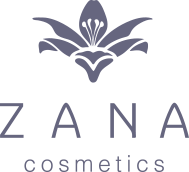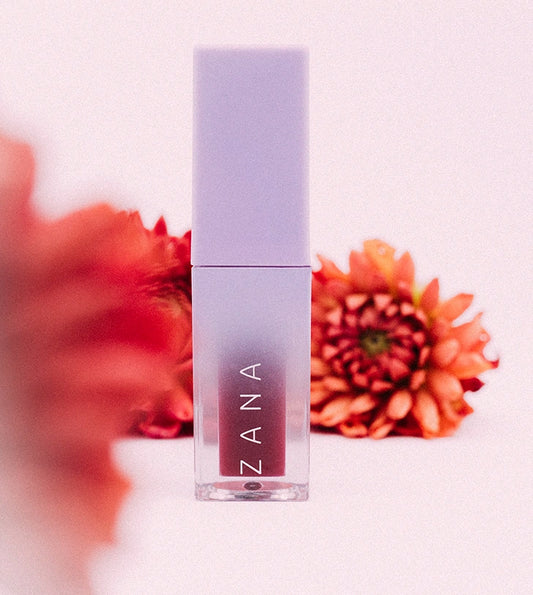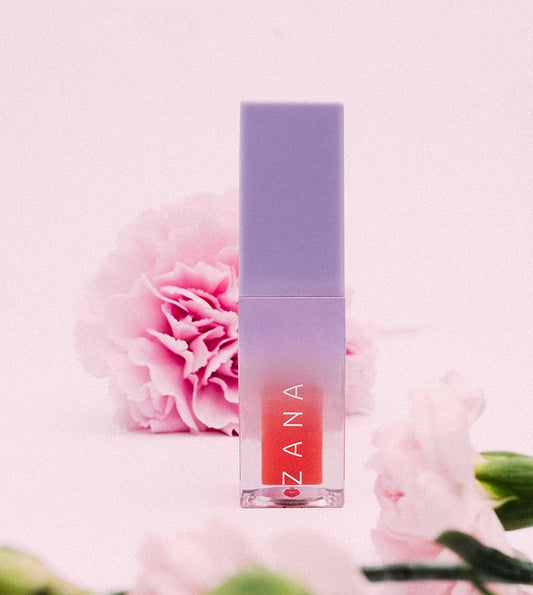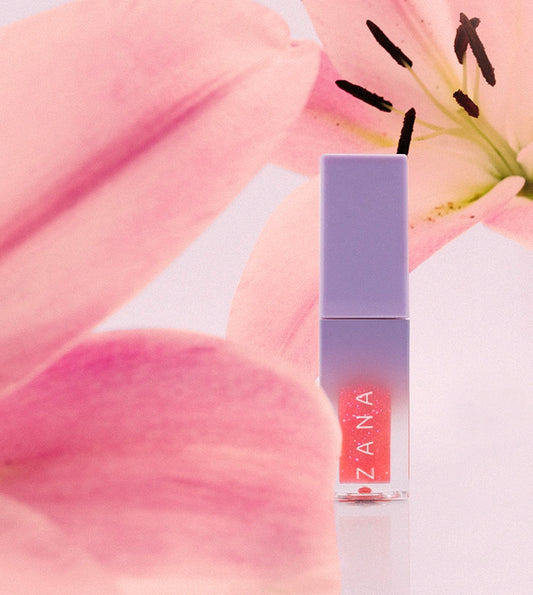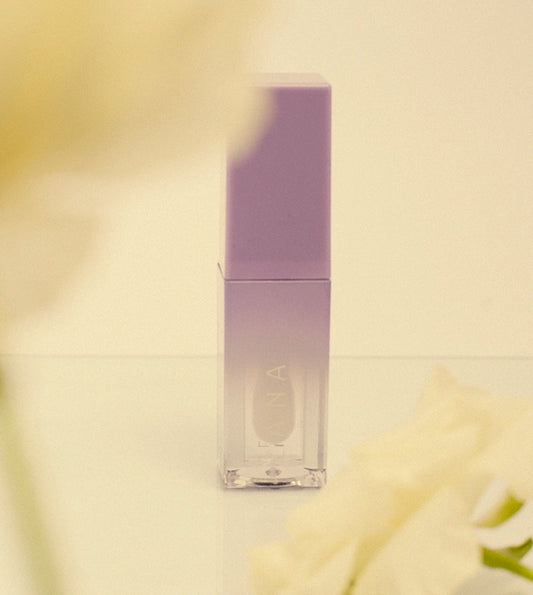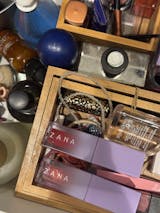
How to protect your lips in the summer – UV filter, hydration and regeneration
Why do lips need special care in summer?
Go to the next paragraphs:
The summer months pose a real challenge for the delicate skin of our lips. Intense sunlight, dry air in air-conditioned rooms, sea salt, and constant exposure to wind mean our lips require increased attention and specialized care. Protecting our lips in the summer isn't a whim, but a real necessity, helping to maintain their healthy appearance and comfort throughout the season.
The skin on the lips is almost five times thinner than on the rest of the face and has virtually no sebaceous glands, which naturally moisturize it. Furthermore, it doesn't produce melanin, which would protect against the harmful effects of UV rays. These anatomical features make the lips particularly susceptible to dryness, chapping, and sunburn.
The effects of a lack of proper protection are quickly felt: chapped lips, painful cracks, peeling skin, and in extreme cases, even burns and long-term damage. UVA and UVB radiation can also accelerate the aging process, leading to the formation of fine lines around the lips and a loss of their natural fullness.
Regularly protecting your lips in the summer is an investment in their long-term health and beautiful appearance. With proper care, you can enjoy soft, smooth lips throughout the entire holiday season, regardless of weather conditions or outdoor activities.
What to use for lip care in summer?
Summer lip care requires the use of products that combine protective and regenerative properties. The most important category is lip balms with UV filters, which create a protective barrier against solar radiation while intensely moisturizing delicate skin.
A lip balm with SPF should contain deeply moisturizing ingredients, such as shea butter, which perfectly regenerates and protects against moisture loss. Jojoba oil, the closest in composition to the natural sebum of human skin, provides long-lasting hydration without a sticky feel. Coconut oil, on the other hand, has antibacterial and soothing properties, ideal for sun-irritated skin.
When choosing products, it's important to pay attention to ingredients and avoid paraffin-based ingredients, which can create an impenetrable layer on the skin's surface. Natural ingredients are not only more effective but also safer for long-term use.
Sunscreens are another important category of summer products. Choose those with an SPF of at least 15, preferably 30, which will provide adequate protection during everyday activities. For intense sun exposure, such as beach time or water sports, products with a higher protection factor are needed.
Natural oils can be used as a supplement to your evening skincare routine. Argan oil, rich in vitamin E, perfectly regenerates damaged skin, while raspberry seed oil contains natural UV filters, supporting sun protection.
How to protect your lips from the sun?
Sun protection for lips is the foundation of summer skincare. UV radiation affects the lips just as intensely as it does the rest of the face, and due to the lack of natural melanin, the effects can be even more severe.
How to care for your lips in the summer with sun protection? First and foremost, regularly use products with SPF. SPF 15 is the minimum for daily use, but SPF 30 is optimal, providing effective protection for most of the day. For intense sun exposure—beaching, water sports, or mountain hiking—choose products with SPF 50.
Regular application is key. Sunscreen should be applied every 2-3 hours, and after every meal, drink, or contact with water. A regular lip balm with SPF won't suffice for prolonged sun exposure—you need a dedicated protective product with a waterproof formula.
Remember that sun protection should be used year-round, but it's especially important in the summer. Even on cloudy days, up to 80% of UV radiation reaches the skin, so daily application of sunscreen is the foundation of a healthy skincare routine.
Home remedies for moisturizing your lips
You can successfully prepare natural lip cosmetics in your home kitchen, using ingredients with proven skincare properties. Home remedies for lip hydration are not only effective but also economical and free from artificial additives.
The classic honey and extra virgin olive oil mask is a recipe that has been tried and tested for generations. Mix a teaspoon of natural honey with a few drops of olive oil, apply to lips for 10-15 minutes, then gently rinse with lukewarm water. Honey has moisturizing and antibacterial properties, while olive oil provides valuable fatty acids and vitamins.
Coconut oil used alone is the easiest way to provide intense hydration. Melt a small amount of oil between your fingers and gently massage into your lips. It's best to do this in the evening so the active ingredients can work overnight. Coconut oil has a natural SPF of around 7, providing gentle sun protection.
Shea butter with added vitamin E is an effective regenerative treatment. Melt a teaspoon of shea butter, add the contents of one vitamin E capsule, mix, and allow to set. Use in the evening as an intensively nourishing mask. This blend is especially effective for very dry, chapped lips.
Regular use of home treatments 2-3 times a week significantly improves the condition of the skin on your lips. Natural ingredients work gently yet effectively, restoring softness and smoothness to your lips without the risk of irritation.
How does diet affect oral health?
Lip health depends largely on what we eat and drink. Proper hydration is essential – dehydrated skin quickly loses elasticity and becomes susceptible to cracking. Adults should drink at least 2 liters of water daily, and even more in the summer, during intense sun exposure.
Vitamins play a crucial role in maintaining healthy lips. Vitamin A, found in carrots, sweet potatoes, and green leafy vegetables, supports cell regeneration and maintains healthy skin. Vitamin E, found in nuts, seeds, and vegetable oils, acts as a natural antioxidant, protecting against free radicals.
Vitamin C, abundant in citrus fruits, berries, and vegetables, supports collagen production and improves skin elasticity. B vitamins, especially B2 and B6, prevent cracks in the corners of the mouth and maintain proper hydration of the mucous membranes.
Omega-3 fatty acids, found in oily fish, walnuts, and flaxseed oil, improve skin elasticity and hydration from within. Regular consumption of these nutrients translates to better skin condition throughout the body, including the lips.
Avoid excessive alcohol and caffeine consumption, which have a dehydrating effect. Also, limit highly salty snacks, which can lead to dehydration and worsen skin condition.
Natural ingredients worth knowing
Natural lip care is based on several key ingredients with proven nourishing properties. Shea butter, derived from the nuts of the karité tree, is one of the most effective natural emollients. It contains a high concentration of vitamins A and E and fatty acids, which intensively regenerate and protect against moisture loss. It is ideal for very dry, chapped skin.
Coconut oil contains lauric acid, which has antibacterial and anti-inflammatory properties. It has a light consistency, absorbs easily, and provides long-lasting hydration. It remains liquid at high temperatures, making it easier to apply, and solidifies when cooled, creating a protective layer on the skin.
Jojoba oil is technically a liquid wax, which makes its structure most similar to the natural sebum of human skin. This allows it to absorb perfectly without leaving a greasy film on the surface. It has antibacterial and anti-inflammatory properties, making it ideal for sensitive and irritation-prone skin.
Honey is a natural humectant that attracts and retains moisture in the skin. It has antibacterial and soothing properties, making it perfect for irritated or damaged skin. It's best to choose natural, unprocessed honey, which retains all its beneficial properties.
These ingredients can be used alone or combined in different proportions to create personalized blends tailored to individual skin needs.
Summer skincare routine – step by step
Effective lip protection in summer requires a systematic approach and a daily skincare routine tailored to the challenges of summer. Start in the morning by gently cleansing your lips with a soft, damp cloth. This will remove any residue from your nighttime skincare routine and prepare the skin for the application of protective products.
The next step is to apply a sunscreen with SPF. Choose a product with at least an SPF of 30 and apply it regularly throughout the day, especially before sun exposure, after meals, and after contact with water. If you plan on spending a lot of time in the sun, use a waterproof product with a higher protection factor.
Once or twice a week, use a gentle exfoliator to remove dead skin cells and prepare the skin to better absorb nutrients. In the summer, choose gentle sugar-based exfoliators with added oil, which won't overly irritate sun-exposed skin.
In the evening, after thoroughly washing off protective products, apply intensive regenerative care. These can include natural oils, shea butter, or homemade masks made with honey and vegetable oils. Skin regenerates overnight, so it's the perfect time for deep hydration and nourishment.
When traveling, always carry a sunscreen and apply it regularly, especially on airplanes, where dry air can further dehydrate your skin. After sun exposure, use soothing products with aloe or panthenol to help soothe any irritation.
Frequently asked questions (FAQ)
Is coconut oil alone enough to protect your lips in the summer? Coconut oil has a natural SPF of around 7, which only provides basic protection. For intense sun exposure, you need products with a higher SPF, at least 30.
How often should you apply lip balm with SPF? A product with UV protection should be applied every 2-3 hours and after every meal, drink, or contact with water. Reapply more frequently when at the beach.
What to do if your lips still chap despite regular care? Dry lips in the summer may require more intensive care. Increase the frequency of moisturizing products, use a shea butter mask in the evening, and make sure you're drinking enough water.
Can I use a moisturizer with SPF at night? UV filters can be a bit drying, so it's better to use dedicated regenerative products without SPF at night, which intensely moisturize and renew the skin.
How to store natural cosmetics in hot weather? Natural products, especially those containing oils, are best stored in a cool, dry place. During hot weather, they can be stored in the refrigerator – the cool product also soothes irritated skin.
Does lip makeup require special protection in the summer? Yes, always apply a balm with UV protection under your lipstick. Choose lipsticks with a creamy consistency and added moisturizing ingredients, and avoid matte formulas, which can further dry out your lips.
Healthy lips all summer long
Lip protection in summer is a daily care routine that requires a systematic approach and carefully selected products. Combining sun protection with intense hydration and regeneration is key to maintaining healthy, beautiful lips throughout the holiday season.
Natural ingredients and home treatments are a perfect complement to your daily skincare routine. They are effective, safe, and allow you to personalize your care to meet your individual skin needs.
Remember that healthy lips aren't just about aesthetics, but above all, about comfort and well-being. Investing in proper care pays off year-round, and habits developed in the summer will serve you well for months to come.
Take natural and effective care of your lips today. Check out our line of natural protective balms with UV filters – available online, designed for summer care and everyday protection.

